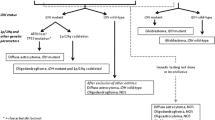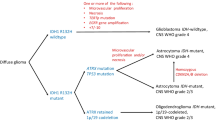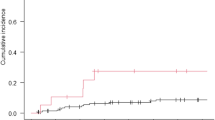Abstract
Background
5-Aminolevulinic acid (5-ALA)-guided resection of gliomas in adults enables better differentiation between tumor and normal brain tissue, allowing a higher degree of resection, and improves patient outcomes. In recent years, several reports have emerged regarding the use of 5-ALA in other brain tumor entities, including pediatric brains tumors. Since gross total resection (GTR) of many brain tumors in children is crucial and the role of 5-ALA-guided resection of these tumors is not clear, we sought to perform a comprehensive literature review on this topic.
Methods
A systematic literature review of EMBASE and MEDLINE/PubMed databases revealed 19 eligible publications encompassing 175 5-ALA-guided operations on pediatric brain tumors. To prevent bias, publications were revised independently by two authors.
Results
We found that 5-ALA-guided resection enabled the surgeons to identify the tumor more easily and was considered helpful mainly in cases of glioblastoma (GBM, 21/27, 78%), anaplastic ependymoma WHO grade III (10/14, 71%), and anaplastic astrocytoma (4/6, 67%). In contrast, cases of pilocytic astrocytomas (PAs) and medulloblastomas 5-ALA-guided surgery did not show consistent fluorescent signals and 5-ALA was considered helpful only in 12% and 22% of cases, respectively. Accumulation of fluorescent porphyrins seems to depend on WHO tumor grading. One important finding is that when 5-ALA-guided resections were considered helpful, the degree of resection was higher than is cases where it was not helpful. The rate of adverse events related to 5-ALA was negligible, especially new postoperative sequelae.
Conclusion
5-ALA could play a role in resection of pediatric brain tumors. However, further prospective clinical trials are needed.


Similar content being viewed by others

References
Abernethy LJ, Avula S, Hughes GM, Wright EJ, Mallucci CL (2012) Intra-operative 3-T MRI for paediatric brain tumours: challenges and perspectives. Pediatr Radiol 42(2):147–157
Agawa Y, Wataya T (2018) The use of 5-aminolevulinic acid to assist gross total resection of pediatric astroblastoma. Childs Nerv Syst 34(5):971–975
Albright AL (1993) Pediatric brain tumors. CA Cancer J Clin 43(5):272–288
Albright AL, Wisoff JH, Zeltzer PM, Boyett JM, Rorke LB, Stanley P (1996) Effects of medulloblastoma resections on outcome in children: a report from the Children’s Cancer Group. Neurosurgery 38(2):265–271
Albright AL, Wisoff JH, Zeltzer P, Boyett J, Rorke LB, Stanley P, Geyer JR, Milstein JM (1995) Prognostic factors in children with supratentorial (nonpineal) primitive neuroectodermal tumors. A neurosurgical perspective from the Children’s Cancer Group. Pediatr Neurosurg 22(1):1–7
Barbagallo GMV, Certo F, Heiss K, Albanese V (2014) 5-ALA fluorescence-assisted surgery in pediatric brain tumors: report of three cases and review of the literature. Br J Neurosurg 28(6):750–754
Beez T, Sarikaya-Seiwert S, Steiger H-J, Hänggi D (2014) Fluorescence-guided surgery with 5-aminolevulinic acid for resection of brain tumors in children—a technical report. Acta Neurochir 156(3):597–604
Bernal García LM, Cabezudo Artero JM, Royano Sánchez M, Marcelo Zamorano MB, López Macías M (2015) Fluorescence-guided resection with 5-aminolevulinic acid of meningeal sarcoma in a child. Childs Nerv Syst 31(7):1177–1180
Braunstein S, Raleigh D, Bindra R, Mueller S, Haas-Kogan D (2017) Pediatric high-grade glioma: current molecular landscape and therapeutic approaches. J Neuro-Oncol 134(3):541–549
Briel-Pump A, Beez T, Ebbert L, Remke M, Weinhold S, Sabel MC, Sorg RV (2018) Accumulation of protoporphyrin IX in medulloblastoma cell lines and sensitivity to subsequent photodynamic treatment. J Photochem Photobiol B Biol 189:298–305
Burford MC, Kalyal MN, Pandit DA et al (2017) PP39. 5-Aminolevulinic acid aided resection of paediatric brain tumours: the UK’S first case series. Neuro-Oncology 19(suppl_1):i11
Cavalli FMG, Remke M, Rampasek L et al (2017) Intertumoral heterogeneity within medulloblastoma subgroups. Cancer Cell 31(6):737–754.e6
Cho Y-J, Tsherniak A, Tamayo P et al (2011) Integrative genomic analysis of medulloblastoma identifies a molecular subgroup that drives poor clinical outcome. J Clin Oncol 29(11):1424–1430
Chu ESM, Wong TKS, Yow CMN (2007) Photodynamic effect in medulloblastoma: downregulation of matrix metalloproteinases and human telomerase reverse transcriptase expressions. Photochem Photobiol Sci 7(1):76–83
Díez Valle R, Slof J, Galván J, Arza C, Romariz C, Vidal C (2014) Observational, retrospective study of the effectiveness of 5-aminolevulinic acid in malignant glioma surgery in Spain (the VISIONA study). Neurologia 29(3):131–138
Duffner PK, Cohen ME, Myers MH, Heise HW (1986) Survival of children with brain tumors: SEER Program, 1973-1980. Neurology 36(5):597–601
Eicker SO, Floeth FW, Kamp M, Steiger H-J, Hänggi D (2013) The impact of fluorescence guidance on spinal intradural tumour surgery. Eur Spine J 22(6):1394–1401
Eicker S, Sarikaya-Seiwert S, Borkhardt A, Gierga K, Turowski B, Heiroth H-J, Steiger H-J, Stummer W (2011) ALA-induced porphyrin accumulation in medulloblastoma and its use for fluorescence-guided surgery. Cent Eur Neurosurg 72(2):101–103
Eyüpoglu IY, Hore N, Savaskan NE, Grummich P, Roessler K, Buchfelder M, Ganslandt O (2012) Improving the extent of malignant glioma resection by dual intraoperative visualization approach. PLoS One 7(9):e44885
Feigl GC, Ritz R, Moraes M et al (2010) Resection of malignant brain tumors in eloquent cortical areas: a new multimodal approach combining 5-aminolevulinic acid and intraoperative monitoring. J Neurosurg 113(2):352–357
Giordano M, Samii A, Lawson McLean AC, Bertalanffy H, Fahlbusch R, Samii M, Di Rocco C (2017) Intraoperative magnetic resonance imaging in pediatric neurosurgery: safety and utility. J Neurosurg Pediatr 19(1):77–84
Hadani M, Spiegelman R, Feldman Z, Berkenstadt H, Ram Z (2001) Novel, compact, intraoperative magnetic resonance imaging-guided system for conventional neurosurgical operating rooms. Neurosurgery 48(4):799–807 discussion 807–9
Healey EA, Barnes PD, Kupsky WJ, Scott RM, Sallan SE, Black PM, Tarbell NJ (1991) The prognostic significance of postoperative residual tumor in ependymoma. Neurosurgery 28(5):666–671 discussion 671–2
Hefti M, von Campe G, Moschopulos M, Siegner A, Looser H, Landolt H (2008) 5-aminolevulinic acid induced protoporphyrin IX fluorescence in high-grade glioma surgery: a one-year experience at a single institution. Swiss Med Wkly 138(11–12):180–185
Hirsch JF, Sainte Rose C, Pierre-Kahn A, Pfister A, Hoppe-Hirsch E (1989) Benign astrocytic and oligodendrocytic tumors of the cerebral hemispheres in children. J Neurosurg 70(4):568–572
Idoate MA, Díez Valle R, Echeveste J, Tejada S (2011) Pathological characterization of the glioblastoma border as shown during surgery using 5-aminolevulinic acid-induced fluorescence. Neuropathology 31(6):575–582
Inoue T, Endo T, Nagamatsu K, Watanabe M, Tominaga T (2013) 5-Aminolevulinic acid fluorescence-guided resection of intramedullary ependymoma. Neurosurgery 72(2 Suppl Operative):ons159–ons168. https://doi.org/10.1227/NEU.0b013e31827bc7a3
Kim AV, Khachatryan VA (2017) Intraoperative fluorescence diagnosis using 5-aminolevulinic acid in surgical treatment of children with recurrent neuroepithelial tumors. Zh Vopr Neirokhir Im N N Burdenko 81(1):51
Kool M, Korshunov A, Remke M et al (2012) Molecular subgroups of medulloblastoma: an international meta-analysis of transcriptome, genetic aberrations, and clinical data of WNT, SHH, group 3, and group 4 medulloblastomas. Acta Neuropathol 123(4):473–484
Kortmann RD, Kühl J, Timmermann B et al (2000) Postoperative neoadjuvant chemotherapy before radiotherapy as compared to immediate radiotherapy followed by maintenance chemotherapy in the treatment of medulloblastoma in childhood: results of the German prospective randomized trial HIT ‘91. Int J Radiat Oncol Biol Phys 46(2):269–279
Lam CH, Hall WA, Truwit CL, Liu H (2001) Intra-operative MRI-guided approaches to the pediatric posterior fossa tumors. Pediatr Neurosurg 34(6):295–300
Louis DN, Perry A, Reifenberger G, von Deimling A, Figarella-Branger D, Cavenee WK, Ohgaki H, Wiestler OD, Kleihues P, Ellison DW (2016) The 2016 World Health Organization classification of tumors of the central nervous system: a summary. Acta Neuropathol 131(6):803–820
Maciunas RJ, Berger MS, Copeland B, Mayberg MR, Selker R, Allen GS (1996) A technique for interactive image-guided neurosurgical intervention in primary brain tumors. Neurosurg Clin N Am 7(2):245–266
Mansur DB (2013) Multidisciplinary management of pediatric intracranial ependymoma. CNS Oncol 2(3):247–257
Metellus P, Barrie M, Figarella-Branger D, Chinot O, Giorgi R, Gouvernet J, Jouvet A, Guyotat J (2007) Multicentric French study on adult intracranial ependymomas: prognostic factors analysis and therapeutic considerations from a cohort of 152 patients. Brain 130(Pt 5):1338–1349
Moher D, Liberati A, Tetzlaff J, Altman DG, PRISMA Group (2010) Preferred reporting items for systematic reviews and meta-analyses: the PRISMA statement. Int J Surg 8(5):336–341
Moher D, Shamseer L, Clarke M, Ghersi D, Liberati A, Petticrew M, Shekelle P, Stewart LA (2015) Preferred reporting items for systematic review and meta-analysis protocols (PRISMA-P) 2015 statement. Syst Rev 4(1):1
Moiyadi AV, Shetty P, Degaonkar A (2017) Resection of pediatric brain tumors: intraoperative ultrasound revisited. J Pediatr Neurosci 12(1):19–23
Nabavi A, Thurm H, Zountsas B, Pietsch T, Lanfermann H, Pichlmeier U, Mehdorn M, 5-ALA Recurrent Glioma Study Group (2009) Five-aminolevulinic acid for fluorescence-guided resection of recurrent malignant gliomas: a phase ii study. Neurosurgery 65(6):1070–1076 discussion 1076-7
Northcott PA, Buchhalter I, Morrissy AS et al (2017) The whole-genome landscape of medulloblastoma subtypes. Nature 547(7663):311–317
Northcott PA, Dubuc AM, Pfister S, Taylor MD (2012) Molecular subgroups of medulloblastoma. Expert Rev Neurother 12(7):871–884
Northcott PA, Korshunov A, Witt H et al (2011) Medulloblastoma comprises four distinct molecular variants. J Clin Oncol 29(11):1408–1414
Northcott PA, Shih DJH, Peacock J et al (2012) Subgroup-specific structural variation across 1,000 medulloblastoma genomes. Nature 488(7409):49–56
Orringer DA, Golby A, Jolesz F (2012) Neuronavigation in the surgical management of brain tumors: current and future trends. Expert Rev Med Devices 9(5):491–500
Osorio DS, Allen JC (2015) Management of CNS germinoma. CNS Oncol 4(4):273–279
Ostrom QT, Gittleman H, Fulop J, Liu M, Blanda R, Kromer C, Wolinsky Y, Kruchko C, Barnholtz-Sloan JS (2015) CBTRUS statistical report: primary brain and central nervous system tumors diagnosed in the United States in 2008-2012. Neuro-Oncology 17(suppl 4):iv1–iv62
Packer RJ, Cogen P, Vezina G, Rorke LB (1999) Medulloblastoma: clinical and biologic aspects. Neuro-Oncology 1(3):232–250
Paulino AC, Wen B-C, Buatti JM, Hussey DH, Zhen WK, Mayr NA, Menezes AH (2002) Intracranial ependymomas: an analysis of prognostic factors and patterns of failure. Am J Clin Oncol 25(2):117–122
Piccirillo SGM, Dietz S, Madhu B, Griffiths J, Price SJ, Collins VP, Watts C (2012) Fluorescence-guided surgical sampling of glioblastoma identifies phenotypically distinct tumour-initiating cell populations in the tumour mass and margin. Br J Cancer 107(3):462–468
Pichlmeier U, Bink A, Schackert G, Stummer W, ALA Glioma Study Group (2008) Resection and survival in glioblastoma multiforme: an RTOG recursive partitioning analysis of ALA study patients. Neuro-Oncology 10(6):1025–1034
Pickles JC, Hawkins C, Pietsch T, Jacques TS (2018) CNS embryonal tumours: WHO 2016 and beyond. Neuropathol Appl Neurobiol 44(2):151–162
Preuß M, Renner C, Krupp W et al (2013) The use of 5-aminolevulinic acid fluorescence guidance in resection of pediatric brain tumors. Childs Nerv Syst 29(8):1263–1267
Ritz R, Scheidle C, Noell S, Roser F, Schenk M, Dietz K, Strauss WSL (2012) In vitro comparison of hypericin and 5-aminolevulinic acid-derived protoporphyrin IX for photodynamic inactivation of medulloblastoma cells. PLoS One 7(12):e51974
Robertson PL (2006) Advances in treatment of pediatric brain tumors. NeuroRX 3(2):276–291
Roth J, Beni-Adani L, Biyani N, Constantini S (2006) Classical and real-time neuronavigation in pediatric neurosurgery. Childs Nerv Syst 22(9):1065–1071
Roth J, Biyani N, Beni-Adani L, Constantini S (2007) Real-time neuronavigation with high-quality 3D ultrasound SonoWand in pediatric neurosurgery. Pediatr Neurosurg 43(3):185–191
Roth J, Constantini S (2017) 5ALA in pediatric brain tumors is not routinely beneficial. Childs Nerv Syst 33(5):787–792
Rudin CM, Hann CL, Laterra J et al (2009) Treatment of medulloblastoma with hedgehog pathway inhibitor GDC-0449. N Engl J Med 361(12):1173–1178
Ruge JR, Liu J (2009) Use of 5-aminolevulinic acid for visualization and resection of a benign pediatric brain tumor. J Neurosurg Pediatr 4(5):484–486
Sanai N (2012) Emerging operative strategies in neurosurgical oncology. Curr Opin Neurol 25(6):756–766
Schipmann S, Keurhorst D, Köchling M, Schwake M, Heß K, Sundermann B, Stummer W, Brentrup A (2017) Regression of pineal lesions: spontaneous or iatrogenic? A case report and systematic literature review. World Neurosurg 108:939–947.e1
Schipmann S, Schwake M, Suero Molina E, Roeder N, Steudel W-I, Warneke N, Stummer W (2017) Quality indicators in cranial neurosurgery: which are presently substantiated? A systematic review. World Neurosurg 104:104–112
Schucht P, Beck J, Abu-Isa J, Andereggen L, Murek M, Seidel K, Stieglitz L, Raabe A (2012) Gross total resection rates in contemporary glioblastoma surgery: results of an institutional protocol combining 5-aminolevulinic acid intraoperative fluorescence imaging and brain mapping. Neurosurgery 71(5):927–935 discussion 935–6
Schulz C, Waldeck S, Mauer UM (2012) Intraoperative image guidance in neurosurgery: development, current indications, and future trends. Radiol Res Pract 2012:197364
Schwake M, Günes D, Köchling M, Brentrup A, Schroeteler J, Hotfilder M, Fruehwald MC, Stummer W, Ewelt C (2014) Kinetics of porphyrin fluorescence accumulation in pediatric brain tumor cells incubated in 5-aminolevulinic acid. Acta Neurochir 156(6):1077–1084
Schwake M, Nemes A, Dondrop J, Schroeteler J, Schipmann S, Senner V, Stummer W, Ewelt C (2018) In-vitro use of 5-ALA for photodynamic therapy in pediatric brain tumors. Neurosurgery. https://doi.org/10.1093/neuros/nyy054
Schwalbe EC, Lindsey JC, Nakjang S et al (2017) Novel molecular subgroups for clinical classification and outcome prediction in childhood medulloblastoma: a cohort study. Lancet Oncol 18(7):958–971
Singhal A, Ross Hengel A, Steinbok P, Doug Cochrane D (2015) Intraoperative ultrasound in pediatric brain tumors: does the surgeon get it right? Childs Nerv Syst 31(12):2353–2357
Skjøth-Rasmussen J, Bøgeskov L, Sehested A, Klausen C, Broholm H, Nysom K (2015) The use of 5-ALA to assist complete removal of residual non-enhancing part of childhood medulloblastoma: a case report. Childs Nerv Syst 31(11):2173–2177
Smith H, Taplin A, Syed S, Adamo MA (2016) Correlation between intraoperative ultrasound and postoperative MRI in pediatric tumor surgery. J Neurosurg Pediatr 18(5):578–584
Stummer W, Novotny A, Stepp H, Goetz C, Bise K, Reulen HJ (2000) Fluorescence-guided resection of glioblastoma multiforme by using 5-aminolevulinic acid-induced porphyrins: a prospective study in 52 consecutive patients. J Neurosurg 93(6):1003–1013
Stummer W, Pichlmeier U, Meinel T, Wiestler OD, Zanella F, Reulen H-J, ALA-Glioma Study Group (2006) Fluorescence-guided surgery with 5-aminolevulinic acid for resection of malignant glioma: a randomised controlled multicentre phase III trial. Lancet Oncol 7(5):392–401
Stummer W, Reulen H-J, Meinel T et al (2008) Extent of resection and survival in glioblastoma multiforme: identification of and adjustment for bias. Neurosurgery 62(3):564–576 discussion 564-76
Stummer W, Rodrigues F, Schucht P et al (2014) Predicting the “usefulness” of 5-ALA-derived tumor fluorescence for fluorescence-guided resections in pediatric brain tumors: a European survey. Acta Neurochir 156(12):2315–2324
Stummer W, Stocker S, Novotny A, Heimann A, Sauer O, Kempski O, Plesnila N, Wietzorrek J (1998) In vitro and in vivo porphyrin accumulation by c6 glioma cells after exposure to 5-aminolevulinic acid. J Photochem Photobiol B 25(2–3):160–169
Stummer W, Stocker S, Wagner S, Stepp H, Fritsch C, Goetz C, Goetz AE, Kiefmann R, Reulen HJ (1998) Intraoperative detection of malignant gliomas by 5-aminolevulinic acid-induced porphyrin fluorescence. Neurosurgery 42(3):518–525 discussion 525–6
Stummer W, Tonn J-C, Goetz C, Ullrich W, Stepp H, Bink A, Pietsch T, Pichlmeier U (2014) 5-Aminolevulinic acid-derived tumor fluorescence. Neurosurgery 74(3):310–320
Suzuki T, Ishihara S, Fukuoka K, Kohga T, Shirahata M, Adachi J, Yanagisawa T, Matsutani M, Mishima K, Fujimaki T, Nishikawa R (2012) Neuroendoscopic photodynamic diagnosis and biopsy of intraventricular germinomas using 5-aminolevulinic acidNeuroendoscopic photodynamic diagnosis and biopsy of intraventricular germinomas using a 5-aminolevulinic acid 0078. 40th Annual Meeting of the International Society for Pediatric Neurosurgery, Sydney, Australia, September 9-13, 2012. Childs Nerv Syst (2012) 28:1589–1669. https://doi.org/10.1007/s00381-012-1849-y
Sweeney JF, Smith H, Taplin A, Perloff E, Adamo MA (2018) Efficacy of intraoperative ultrasonography in neurosurgical tumor resection. J Neurosurg Pediatr 21(5):504–510
Swinney C, Li A, Bhatti I, Veeravagu A (2016) Optimization of tumor resection with intra-operative magnetic resonance imaging. J Clin Neurosci 34:11–14
Taylor MD, Northcott PA, Korshunov A et al (2012) Molecular subgroups of medulloblastoma: the current consensus. Acta Neuropathol 123(4):465–472
Tonn J-C, Stummer W (2008) Fluorescence-guided resection of malignant gliomas using 5-aminolevulinic acid: practical use, risks, and pitfalls. Clin Neurosurg 55:20–26
Tsugu A, Ishizaka H, Mizokami Y, Osada T, Baba T, Yoshiyama M, Nishiyama J, Matsumae M (2011) Impact of the combination of 5-aminolevulinic acid-induced fluorescence with intraoperative magnetic resonance imaging-guided surgery for glioma. World Neurosurg 76(1–2):120–127
Valdés PA, Kim A, Brantsch M, Niu C, Moses ZB, Tosteson TD, Wilson BC, Paulsen KD, Roberts DW, Harris BT (2011) δ-aminolevulinic acid-induced protoporphyrin IX concentration correlates with histopathologic markers of malignancy in human gliomas: the need for quantitative fluorescence-guided resection to identify regions of increasing malignancy. Neuro Oncol 13(8):846–856. https://doi.org/10.1093/neuonc/nor086
Valdés PA, Samkoe K, O’Hara JA, Roberts DW, Paulsen KD, Pogue BW (2010) Deferoxamine iron chelation increases delta-aminolevulinic acid induced protoporphyrin IX in xenograft glioma model. Photochem Photobiol 86(2):471–475
Wataya T (2017) Surg-34. Fluorescence-guided surgery with 5-aminolevulinic acid for resection of pediatric brain tumors. Neuro-Oncology 19(Suppl 6):vi242
Willems PWA, van der Sprenkel JWB, Tulleken CAF, Viergever MA, Taphoorn MJB (2006) Neuronavigation and surgery of intracerebral tumours. J Neurol 253(9):1123–1136
Wisoff JH, Boyett JM, Berger MS et al (1998) Current neurosurgical management and the impact of the extent of resection in the treatment of malignant gliomas of childhood: a report of the Children’s Cancer group trial no. CCG-945. J Neurosurg 89(1):52–59
Zebian B, Vergani F, Lavrador JP, Mukherjee S, Kitchen WJ, Stagno V, Chamilos C, Pettorini B, Mallucci C (2017) Recent technological advances in pediatric brain tumor surgery. CNS Oncol 6(1):71–82
Author information
Authors and Affiliations
Corresponding author
Ethics declarations
Conflict of interest
Walter Stummer has received consultant fees from Medac, Wedel, Germany. All other authors declare that they have no conflict of interest.
Ethical approval
For this type of study, formal consent is not required.
Additional information
Publisher’s note
Springer Nature remains neutral with regard to jurisdictional claims in published maps and institutional affiliations.
This article is part of the Topical Collection on Pediatric Neurosurgery
Rights and permissions
About this article
Cite this article
Schwake, M., Schipmann, S., Müther, M. et al. 5-ALA fluorescence–guided surgery in pediatric brain tumors—a systematic review. Acta Neurochir 161, 1099–1108 (2019). https://doi.org/10.1007/s00701-019-03898-1
Received:
Accepted:
Published:
Issue Date:
DOI: https://doi.org/10.1007/s00701-019-03898-1



